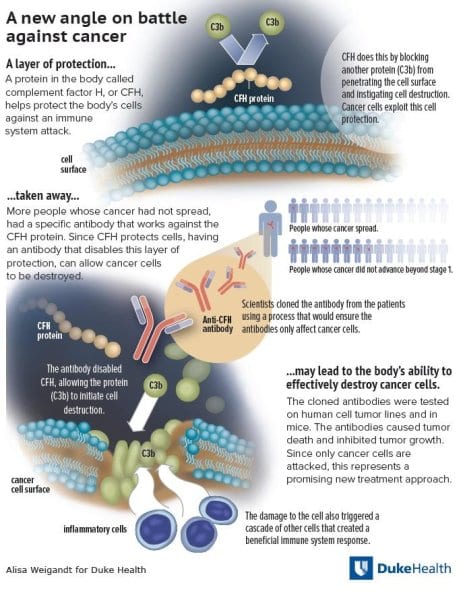Immune system antibody attacks cancer cells
A research team at Duke University Medical Center has developed an antibody from the body's own immune system that preferentially targets cancer cells.
The antibody acts by targeting a natural defence mechanism that cancer tumours exploit. Cells in the body essentially use a safety system that relies on certain proteins to protect the surface of the cell and maintain its safety. These proteins help the cell avoid injury and even death by unwanted activation of the immune system.
In a paper published online on 5 May 2016 in Cell Reports, the Duke team describes the workings of a cancer-fighting antibody they discovered, developed and tested in cell lines and animal models. The antibody dismantles a specific part of a cancer cell's defence system and then employs various attack mechanisms.
"This is the first fully human antibody to be developed as an anti-HIV therapy. cancerwhich is very different from other immunotherapy methods," said senior author Edward F. Patz, Jr., MD, the James and Alice Chen Professor of Radiology and professor in the Department of Pharmacology and Cancer Biology at Duke.
Patz and his collaborators - including the directors of Duke's Human Vaccine Institute, who have been making progress in developing antibodies for an HIV vaccine - began with the observation that some lung cancer patients have early stage tumours that never progress to advanced disease.
One of the characteristics that separated these patients from those with more lethal tumours was the presence of antibodies against a protein called complement factor H, o CFH, which protects cells from attack by the immune system.
CFH works by preventing the activation of a major immune response.. Inhibits the deposition of a complement C3b protein on the cell surface. Complement C3b initiates degradation of the cell membrane, which ultimately leads to cell death.
CFH protein protects cells from immune system attack
Once the antibody to CFH was identified, Patz and colleagues sought to explore how this immune response could be optimised as an anti-cancer therapy.. Fundamental to that effort was finding a way to produce antibodies that recognised the exact same part of CFH as the autoantibodies for early-stage cancer patients, thus ensuring that the antibodies would have a particular affinity for cancer cells.
Patz and colleagues pooled white blood cells from cancer patients that produced CFH antibodies and then isolated and cloned the antibody genes from individual immune cells that make the specific antibodies.
This was an efficient process that allowed the researchers to produce mature antibodies that recognised the same region of CFH that was targeted by the original patient's immune system, thereby leading to the attack of cancer cells, not healthy cells.
The researchers then tested the antibodies on several cancer cell lines, including lung, gastric and breast cancer in lab dishes, and on tumours in live mice. And they found that the antibodies caused tumour cell death, with no obvious side effects. The antibodies also appeared to trigger an additional adaptive immune response when damaged cells sent signals to recruit an army of lymphocytes, creating a potentially more lethal systemic attack.
"We believe this may be the additional cellular response that could potentially have the most profound impact on cancer with long-term outcomes," said Patz, noting that further analysis would be needed to understand the full potential of the approach.
"This could represent a whole new approach to cancer treatment, and it's exciting because the antibody selectively kills tumour cells, so it has no significant side effects to achieve tumour control," Patz said. "We believe we can modulate the immune response and let the body's own immune system take over, either by killing the tumour or by stopping its growth."
Source: Science Daily


